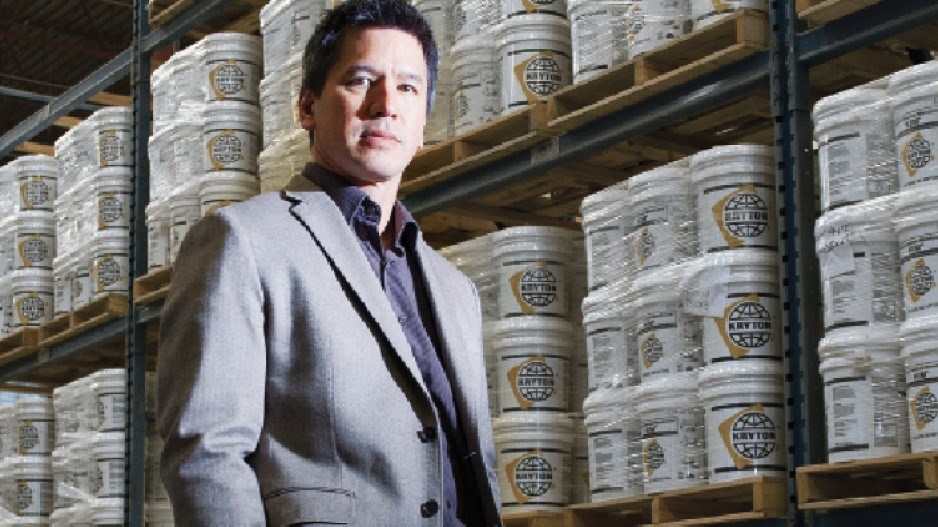Last week, B.C. businesses were starting to feel the pain of the most recent port trucking strike in Vancouver.
"We can't get [shipping containers], and we can't move them," said Kevin Yuers, who co-owns Kryton International Inc. with his sister, Kari Yuers.
"We can't even move them to another port because we can't get the empty containers."
Three weeks ago, Kari Yuers was confidently assuring potential clients in the Middle East, India and Thailand that the concrete waterproofing product her company makes could be shipped in high enough volumes to meet their needs.
"One of our customers – who is a very good customer – challenged us to make sure we could commit to supplying 50 containers of product out of Vancouver," said Kari Yuers.
But she had a rude awakening when she returned to Vancouver.
"I come home, only to find there's a strike going on, and we can't get the cans delivered," she said.
"The product's being piled up to the rafters in my warehouse."
On February 26, around 1,000 non-unionized container truckers who have organized as the United Trucking Association (UTA) walked off the job. On March 6, 400 members of the Unifor-Vancouver Container Trucking Association (VCTA) were set to join them but decided to hold off after talks between the UTA, VCTA, government, the port and labour mediator Vince Ready led to recommendations for a deal Thursday afternoon. (Update: Unifor-VCTA voted March 8 to reject the tentative agreement reached March 6 and joined the UTA work stoppage March 10.)
Both trucking groups say long wait times and low pay rates top their concerns.
If both groups had stopped working, it would have left 600 container trucks out of the usual complement of 2,000 – definitely not enough to provide "business as usual" service, according to Port Metro Vancouver.
B.C. businesses have faced this situation before: truckers went on strike for 47 days in 2005. The issues then, as now, were long waiting times and low pay rates for container truck drivers, many of whom are paid by the trip, not by the hour.
That dispute was resolved only after Ready hammered out a deal to increase rates for non-unionized truckers who own their trucks. B.C.'s Ministry of Transportation investigates allegations of rate undercutting, while Port Metro Vancouver enforces the rates.
The port authority says data it has collected on truck waiting times in 2013 shows that only 5% of drivers wait for more than two hours, while 63% take under one hour to complete their drop-off or pickup.
However, other container trucking system observers say that eight years after the 2005 strike, port efficiency has deteriorated and pay rates have declined.
"The lesson from 2005 was the way they got the truckers to go back to work was to give them an increase in rates so they could afford to keep running, even if the port wasn't running at the efficiency level it should have been," said Phil Davies, a Vancouver-based trucking consultant.
Davies co-authored a May 2013 report on the labour issues facing the industry. According to that report, the number of profitable trips for Metro Vancouver container truckers has dropped 21% since 2006. The number of trips that did not generate profit increased 26% between 2006 and 2013. The report also found that, despite the audit and enforcement system run by the province and Port Metro Vancouver, some truckers are getting paid less than the minimum rate agreed to in 2005. (That per-trip rate was set at $90 in 2005 and raised to $100 in 2006 but has not been increased since.)
In 2013, 41% of drivers reported receiving a per-trip rate of $100, the minimum set by Ready for the shortest possible distance; 15% reported receiving less than $100. Truckers who are not unionized and who own and operate their own vehicles make an average annual income of $35,282.
"If they were getting the Ready rates, the owner-operators would be getting a significantly higher income," Davies said.
The Ready rates did work for a time, said Peter Hall, a professor of urban studies at Simon Fraser University who has studied ports in several cities.
But in recent years, both rates and enforcement have slipped.
"If you had a mechanism to constantly adjust the Ready rates so that they reflected the real costs of trucking, that certainly would be an improvement on what we currently have."
Hall added that Metro Vancouver's container truckers are the weak link in the port supply chain, and the owner-operator model is partly to blame.
Owner-operators own their own vehicles and are usually hired as contractors by larger trucking companies. They make up 43% of the total port trucking labour force. Hall said the model is popular because it gives truckers independence and allows them to take on other trucking jobs if there isn't enough work at the port. It also gives trucking companies more flexibility.
But it also encourages rate undercutting, a practice the port attempted to curtail by freezing some new trucking licences in October 2013.
"Part of what fixed rates as opposed to employment does is it gives the drivers an incentive to cut costs, to cut corners, to not drive on the truck routes," Hall said. "I definitely acknowledge the arguments that a per-hour payment system is more expensive overall, but it might be worth the money." •




